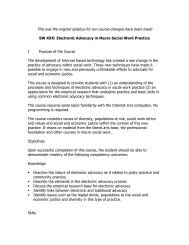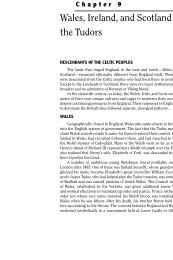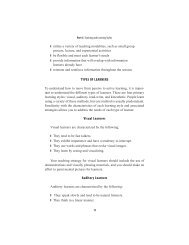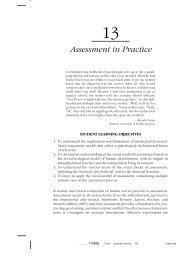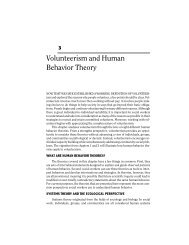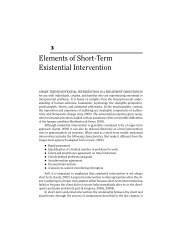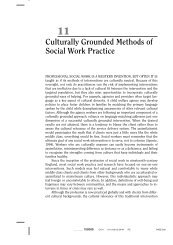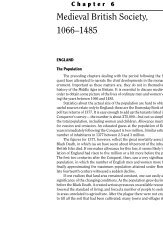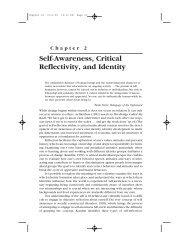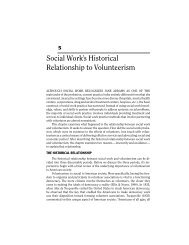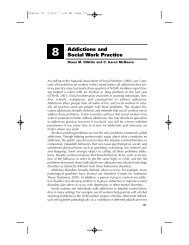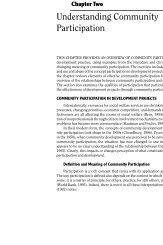Society and Economy in England, 1715–1763 - Lyceum Books
Society and Economy in England, 1715–1763 - Lyceum Books
Society and Economy in England, 1715–1763 - Lyceum Books
Create successful ePaper yourself
Turn your PDF publications into a flip-book with our unique Google optimized e-Paper software.
56 Part I The Age of the L<strong>and</strong>ed Oligarchy<br />
clearly that of Field<strong>in</strong>g: Sophia vows never to marry without her father’s consent,<br />
but she also refuses to marry his choice (<strong>in</strong> this case the snivel<strong>in</strong>g Mr. Blifil), s<strong>in</strong>ce<br />
she does not love him.<br />
Such issues reached to the heart of marriage <strong>and</strong> family life themselves. What<br />
was the nature of the relationship between husb<strong>and</strong> <strong>and</strong> wife, or between parents<br />
<strong>and</strong> children, <strong>in</strong> eighteenth-century Engl<strong>and</strong>? The surviv<strong>in</strong>g evidence sheds most<br />
light on the families of the l<strong>and</strong>owners <strong>and</strong> the well-to-do people of the middl<strong>in</strong>g<br />
sorts. The law was clear: as the famous legal philosopher Sir William Blackstone<br />
put it, “In marriage husb<strong>and</strong> <strong>and</strong> wife are one person <strong>and</strong> that person is the husb<strong>and</strong>.”<br />
In the gentry <strong>and</strong> aristocracy, a woman was supposed to be under the care<br />
(<strong>and</strong> the control) of a man all her life—first her father, then her husb<strong>and</strong>. But here,<br />
too, actual behavior was chang<strong>in</strong>g. Family life, like the social structure itself, had<br />
long been authoritarian <strong>and</strong> patriarchal. For many centuries, the father had ruled<br />
the roost; the husb<strong>and</strong> dem<strong>and</strong>ed absolute obedience from his wife; the parents<br />
together dem<strong>and</strong>ed obedience from the children; <strong>and</strong> the l<strong>in</strong>eage itself was more<br />
important than the <strong>in</strong>dividuals of any one generation. In the seventeenth century,<br />
Puritanism had accentuated patriarchal control <strong>in</strong> the family <strong>and</strong> had <strong>in</strong>tensified<br />
the parental desire to subord<strong>in</strong>ate the will of the children to their own, as well as<br />
to close the nuclear family to the claims of the l<strong>in</strong>eage as a whole. That peculiar<br />
Puritan <strong>in</strong>tensity tended to dim<strong>in</strong>ish dur<strong>in</strong>g the eighteenth century. The reasonableness<br />
<strong>and</strong> tolerance advocated <strong>in</strong> late seventeenth- <strong>and</strong> early eighteenth-century<br />
thought mitigated some of the harsh <strong>in</strong>tensity of the Puritan-style family <strong>and</strong> led<br />
to more companionable relations between husb<strong>and</strong>s <strong>and</strong> wives as well as to more<br />
affectionate concern by parents for their children. For this reason, toys <strong>and</strong> children’s<br />
books emphasiz<strong>in</strong>g fun <strong>and</strong> pleasure became important consumer items for<br />
the first time <strong>in</strong> the eighteenth century.<br />
Of course, not all English families became warm <strong>and</strong> affectionate. Among the<br />
wealthiest l<strong>and</strong>ed families, the great fortunes still allowed parents to neglect their<br />
children. In the eighteenth century, the English custom emerged of send<strong>in</strong>g the<br />
children away to school as early as possible. For example, Robert Walpole, who was<br />
later to become prime m<strong>in</strong>ister, was sent away at age six to board<strong>in</strong>g schools <strong>and</strong><br />
later to Cambridge, <strong>and</strong> he returned only at age twenty-two, rarely hav<strong>in</strong>g spent<br />
more than a few weeks at home. Among the poorest families, poverty ensured that<br />
parental attitudes toward children rema<strong>in</strong>ed erratic <strong>and</strong> unpredictable, alternat<strong>in</strong>g<br />
among warmth, cruelty, <strong>and</strong> <strong>in</strong>difference. Young men <strong>and</strong> women among the lowest<br />
levels of the labor<strong>in</strong>g poor could marry without fear<strong>in</strong>g that their parents would<br />
punish them through dis<strong>in</strong>heritance, because there was no property to be <strong>in</strong>herited.<br />
They also found all too often that they could not feed all the children they produced.<br />
Among these families, brutality born of ignorance <strong>and</strong> frustration sometimes<br />
stood at a high level. F<strong>in</strong>ally, Puritanism kept its hold on many families. Cotton<br />
Mather, the colonial Puritan div<strong>in</strong>e, wrote of childrear<strong>in</strong>g:<br />
First I beget <strong>in</strong> them a high op<strong>in</strong>ion of their father’s love to them <strong>and</strong> of<br />
his be<strong>in</strong>g able to judge what shall be good for them. Then I make them sensible<br />
‘tis folly for them to pretend unto any wit or will of their own; they



